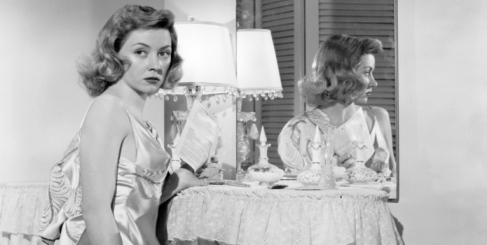Well hello again. After a few months away from writing (and more or less away from film in general), I’ve decided to resurrect this blog. I think my original mission may have been a bit too ambitious for me to undertake at the time, but I do feel the need to express my thoughts on film again, so I’ll be using this space for more general reviews for now, with the occasional foray back into Micheaux and his contemporaries. But for my first entry back, I’ve decided to focus on another obscure little film from a different under-appreciated-in-his-time American master, Nicholas Ray’s third movie, A Woman’s Secret.
This was Ray’s third and least well known film of 1949, following his seminal debut They Live By Night and the Bogart-starrer Knock On Any Door. Honestly, despite the success of those other films, Ray had not yet fully developed his directorial voice and taken on its own, this hybrid noir/backstage drama isn’t among his most distinctive or interesting works. There are brief touches of humor and a few strong visual moments that help it stand ahead of any number of forgotten cheap noirs that RKO and the like put out in the late forties, but in truth, it may be best to put aside Ray’s role in this film for most of this discussion (and as someone who routinely lists Ray as his favorite American filmmaker, that is quite difficult). You see, Ray’s name isn’t the one that should jump out at you in the credits; rather it should be that of the film’s writer, Herman J. Mankiewicz. You see, this film shares much of Citizen Kane’s narrative structure, and they also just so happen to share a writer.

Gloria Grahame in A Woman’s Secret
Opening with an argument between washed-up singer Marian Washburn (Maureen O’Hara) and her friend and protégé Susan Caldwell (Gloria Grahame) that ends with an off-screen gunshot and Susan fighting for her life, the film uses the investigation into the incident as a springboard for various flashbacks from different perspectives on the relationship between the characters. Although Marian immediately confesses to the crime, their piano-playing partner Luke Jordan (Melvyn Douglas) sees the holes in her story and, along with the cops, begins to unravel his memories and the memories of those around them in order to find a motive. While the framing story uses the elements of noir, albeit without as much shadowing and visual cues as the Ray’s more outwardly genre-based films of the time, the flashbacks take the structure of a very muted backstage melodrama. There’s a small sense of jealously and resentment in the interactions between Luke, Marian and Susan, but mostly they actually get along and we are forced to make up our own reasons for how it all goes wrong in the end. Without the nihilism of basic noir to guide us though, it becomes much more difficult to guess at their motivations. Now, Susan isn’t a Charles Foster Kane-esque enigma; her naiveté and basic goodness are rarely questioned and this film chooses to focus on the how, rather than the why, of her shooting. But still, just like Kane, you do feel the mystery of these relationships deepening with every new story.
I think much of the credit for this does belong to Mankiewicz, as the film’s understated emotional development is what most interested me. Of course there are some aesthetic touches of Ray’s personality (ballet dancers gracefully leaping over a passed-out Susan, some odd long-takes and the like), but even I have to admit that this is more of a writer’s film. That being said, it still does make a lot of sense as a piece of the Ray canon. In A Woman’s Secret, there’s no villain in this film pulling the strings and no big reveal at the end (Hell, there isn’t even much of a secret), just emotions getting the better of people, which does strike me as the most Nicholas Ray thing about the whole project. Some of the characters are more likable than others and there are a few that stand out as suspects, but the writer and director chose to avoid the usual constraints of the genre and instead tell a human story. At the end, you are left with the simple sensation that these characters were real and believable people, something Ray always did a better job of than any of his contemporaries.
-Adam

